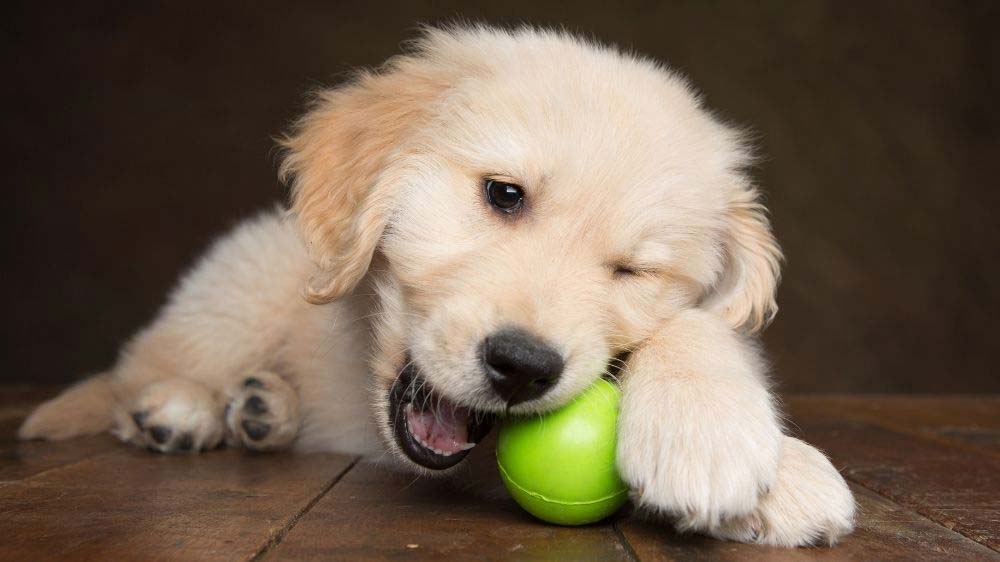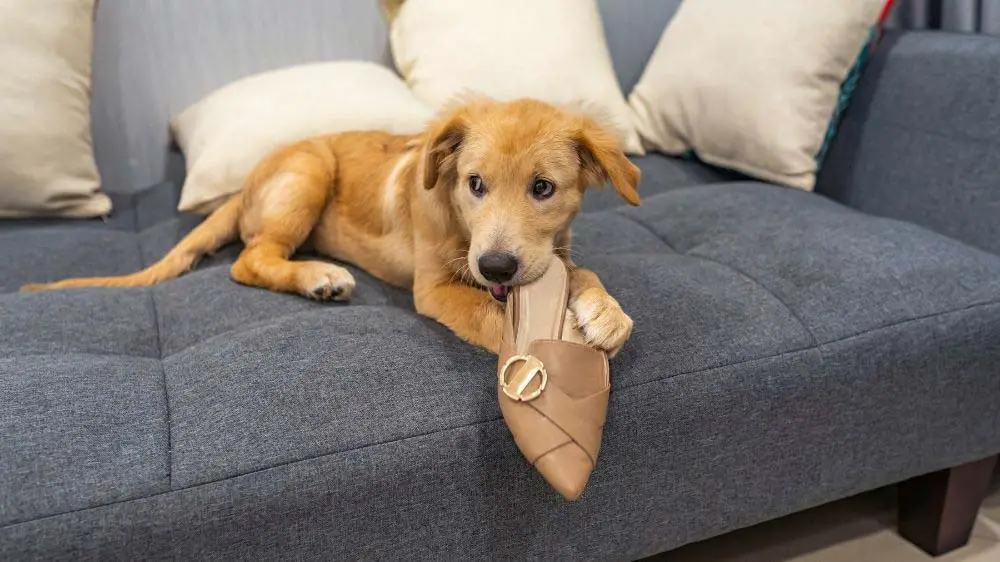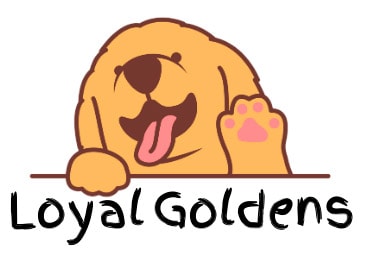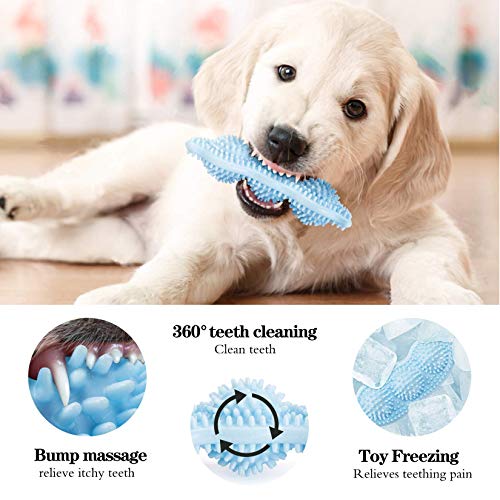Just like in human beings, young Golden Retrievers also lose their baby teeth at a certain stage of their development. This process is known as teething. A Golden Retriever who’s teething will be in some discomfort and you may begin to notice him chewing on inappropriate things around the house to try to ease the pain. The exact age at which a Golden Retriever starts teething can vary from one dog to another.
On average, a Golden Retriever will begin to lose their baby teeth at around 6 months of age, as their adult teeth grow in. Some Goldens, however, can start losing their puppy teeth (also called deciduous or milk teeth) as early as 4 months of age or as late as 7 or even 8 months of age.
To better understand the process of how and when Golden Retrievers shed their teeth, we’ll address the following questions in this article:
- Does chewing cause teeth loss in Golden Retrievers?
- What are the signs of teething?
- Where do the baby teeth go?
- How long does it take to grow new teeth?
- When do Golden Retriever puppies stop chewing on everything?

(This article may contain affiliate links and loyalgoldens may earn a commission if a purchase is made.)
Unlock your goldens natural intelligence and see just how quickly problem behaviors disappear.This is the best at home dog training I've ever used!
Does Excessive Chewing Cause a Golden Retriever’s Baby Teeth to Fall Out?
A Golden Retriever’s chewing on toys or other items is not the direct cause of them losing baby teeth. Losing puppy teeth is a normal event that occurs as a Golden’s adult teeth come in and push the baby teeth up and out. However, a Golden Retriever’s chewing can help to dislodge the baby teeth at the very end.
Golden Retrievers have a well-known behavior of chewing almost anything and everything they come across. As a result, they are known as natural-born chewers.
While chewing is a common habit in most dogs, Golden Retrievers chew more than the average dog breed. You may have already caught your puppy tearing away at your slippers or shoes, right? So why do these pups chew so much?
Here are some reasons why Golden Retrievers chew a lot:
- Chewing helps to exercise and develop your puppy’s facial muscles.
- Chewing is also one way of strengthening the pup’s gums.
- When Golden Retrievers chew at an early age, it’s a natural way of relieving pain caused by teething.
- It is a way of exploring the world (testing new things out of curiosity).
- Dogs belong to the Canidae family that heavily rely on their teeth for tearing and chewing flesh.
- Adult Goldens chew a lot when they are bored or as a way of relieving excess energy and anxiety.
Your Golden Retriever will insist on chewing on things throughout his entire life. Fortunately, as your Golden gets older you can direct that chewing behavior to only appropriate items like tennis balls and chew toys.
What that means is that chewing is not solely part of the teething stage. This action is more of a habit. It could also be genetic, seeing as how Goldens were originally bred to be retrievers; hence they need to learn how to control their bite force in order to retrieve game without damaging it. One of the ways they do this is by chewing.
Recommended Reading: Bite Force of a Golden Retriever in PSI
While it’s normal for Golden Retrievers to chew, you cannot allow them to chew on inappropriate or harmful things. For example, you wouldn’t want every pair of shoes in the house to be completely destroyed by your dog. So here are a few ideas on how to stop your Golden Retriever from chewing on anything harmful or inappropriate:
- Shouting: Shout at your pup when you catch him chewing the wrong object like slippers or shoes. Clapping your hands is another way to distract the pup from the bad behavior.
- Using a commanding voice: You can use firm commands to train your Golden Retriever to stop chewing on the wrong things. Your dog will notice the tone of your voice and immediately stop what they were chewing.
- Switching: Instead of just stopping your dog from chewing on the wrong things, introduce chew toys. They need to understand that these items are what they can freely chew on. For more effective training, give your Golden Retriever something appropriate to chew on when you take away something inappropriate.
- Exercise: Your Golden Retriever may be chewing things out of boredom and pent-up energy.To curb this, you’ll need to regularly take your Golden out for a long walk in the park. You may also exercise him or run around in the yard to help him burn that excess energy. Remember, Golden Retrievers love to exercise and participate in outdoor fun activities.
Although chewing some hard objects may cause your pups’ baby teeth to come out, this will only occur when your dog’s teeth are ready to come out on their own.
Symptoms of Puppy Teething and How To Deal With It
Now that you know your Golden Retriever will start losing his teeth between the ages of four and 8 months, you might be asking yourself about the signs of teething and what to do once you notice these signs. Here are some of the most common symptoms of teething:
- Loss of appetite: One common sign of teething across most Golden Retrievers is a loss of appetite. This should not worry you. Teething hurts, and it’s completely normal for your puppy to eat less during teething. You’re, instead, advised to continue feeding your dog dry dog food as opposed to moist foods. Dry food is good for the development of strong gums and teeth.
- Swollen gums: Another indicator of a teething puppy is swollen gums. When you look inside your dog’s mouth, you’ll see the inflamed-looking reddish gums.
- Gum bleeding: When your Golden Retriever is teething, you may notice blood on his toys and other chewing objects. This is a result of bleeding gums which is a normal occurrence during teething.
So what do you do when you see these signs?
First, rest assured that all these are normal happenings. It means your Golden Retriever puppy is growing just as he should. If you haven’t already, it’s time to get a large assortment of objects and toys for your pup to chew on. This is to help your dog relieve the pain he’s feeling in his gums during the teething process.
- Consider toys with a lot of ridges and nubs on them. Have a variety of both soft and hard toys.
- Frozen objects and cow hooves are other good recommendations for chewing in pups during teething. Some people also give them to adult dogs.
- You may also put knots in a few clean washcloths and put them into the freezer. Once frozen, throw them to your Golden and watch as he chews. During this time, you may even notice some teeth coming off if they’re ready to come off anyway.
Discover how to train your Golden Retriever by playing games: 21 games to play with your Golden that will make them smarter and better behaved!
A chew toy like the one pictured above (Amazon) is an excellent way to help your Golden with his painful teething issues. The nubs on the toy relieve the uncomfortable feeling in his teeth, and you can even freeze the toy to help with the pain of swollen gums.
To lessen the teething pain further, you can try placing a few small pieces of ice cubes in his mouth. You may also rub your puppy’s gums and teeth gently with your fingers. Not only can this help to ease the pain, it will prepare him for when you begin brushing his teeth later on.
Do Golden Retrievers Swallow Their Lost Baby Teeth?
At some point you may notice some gaps in your Goldens mouth and realize that some of his baby teeth are missing. Which may cause you to wonder if your Golden Retriever maybe swallowed their lost baby teeth, because you haven’t found any lying around the house.
As a general rule, teething Golden Retrievers often lose their baby teeth while eating or chewing, causing them to swallow the teeth instead of them falling out onto the ground. A Golden Retriever swallowing their lost puppy teeth is no cause for alarm, as the baby teeth will harmlessly pass through their system.
Your Golden Retriever will obviously not talk to let you know it has lost, or chewed and swallowed, a puppy tooth. Unlike like in small children, where you’ll easily spot gaps between the teeth, you may not notice if your pup has lost some teeth. It’s, therefore, upon you to remain vigilant and take note of these milestones.
Most dogs, Golden Retrievers included, will lose their baby teeth as they eat and swallow them together with food. Some may lose them during object or toy-chewing. You might not come across any of your Golden Retrievers’ teeth throughout the teething phase. But don’t worry about that since swallowing teeth in dogs is completely harmless. The swallowed teeth will easily go through the dogs’ digestive system and out through excretion.
Another thing to note about teething is that pups lose their baby teeth systematically. This starts with the incisors, then canine, also called fangs, and finally premolars. However, this is not a hard and fast rule when it comes to tooth loss.
It’s also important to note that there are no baby molars in growing puppies. Molars come in with the new set of adult teeth.
How Long Does It Take Golden Retrievers To Grow Adult Teeth After Losing Baby Teeth?
All dog breeds, including Golden Retrievers, will start developing baby teeth at 3-5 weeks. You’ll first notice the upper jaw’s incisors’ development immediately, followed by the lower jaw. A full set of 28 baby deciduous teeth will finally occur at around the sixth week. But once the baby teeth fall out, when will a Golden’s adult teeth grow in?
On average your Golden Retriever will have baby teeth for six months, then shed them for a new set of adult teeth. Adult teeth come in almost immediately after losing the baby teeth. Baby teeth come out as a result of pushing by the adult teeth coming in.
This is why you’ll hardly notice any gaps during the teething period in a Golden Retriever puppy. The gaps are filled in very quickly by the adult teeth. In the end, your Golden Retriever will have 42 permanent teeth in his mouth, including molars.
It is recommended that you perform regular checks on your pups’ mouth when adult teeth start to develop. In some cases, you may notice a baby tooth that has refused to budge even after an adult tooth has fully grown behind it. If this happens, take your Golden Retriever to a vet for diagnosis.
What Age Do Golden Retrievers Stop Chewing on Everything?

If you have a Golden Retriever puppy who is chewing on everything he can find in the house, you’re probably wondering when is this excessive chewing going to stop?
In general, a Golden Retriever puppy will want to chew on everything until they are through the teething phase at between 6 to 8 months of age. At this point, the chewing will lessen, but Golden Retrievers will continue to chew throughout their lives. By then they will have learned to only chew on appropriate items.
Conclusion
Teething is a natural stage in a puppy’s dental development. Your Golden Retriever will lose his baby teeth between the age of 4 and 6 months, as his adult teeth are pushing through the gums.
It’s important to note that teething may be a painful stage in a young Golden’s life, during which, his chewing habits may become even more pronounced. If you’re aware of the signs of teething, you can help your Golden Retriever through this period by providing plenty of appropriate items to chew on.
Sources:

